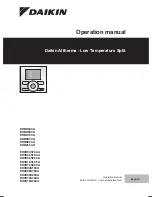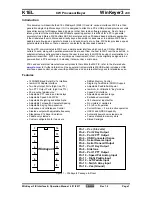
Serial Communications Interface
Technical Data
MC68HC908AB32
—
Rev. 1.0
274
Serial Communications Interface Module (SCI)
MOTOROLA
15.9.6 SCI Data Register
The SCI data register (SCDR) is the buffer between the internal data bus
and the receive and transmit shift registers. Reset has no effect on data
in the SCI data register.
R7/T7–R0/T0 — Receive/Transmit Data Bits
Reading address $0018 accesses the read-only received data bits,
R7:R0. Writing to address $0018 writes the data to be transmitted,
T7:T0. Reset has no effect on the SCI data register.
NOTE:
Do not use read/modify/write instructions on the SCI data register.
Address:
$0018
Bit 7
6
5
4
3
2
1
Bit 0
Read:
R7
R6
R5
R4
R3
R2
R1
R0
Write:
T7
T6
T5
T4
T3
T2
T1
T0
Reset:
Unaffected by reset
Figure 15-15. SCI Data Register (SCDR)
Summary of Contents for MC68HC908AB32
Page 1: ...MC68HC908AB32 D REV 1 0 MC68HC908AB32 HCMOS Microcontroller Unit TECHNICAL DATA ...
Page 2: ......
Page 68: ...FLASH Memory Technical Data MC68HC908AB32 Rev 1 0 68 FLASH Memory MOTOROLA ...
Page 84: ...EEPROM Technical Data MC68HC908AB32 Rev 1 0 84 EEPROM MOTOROLA ...
Page 390: ...Ordering Information Technical Data MC68HC908AB32 Rev 1 0 390 Ordering Information MOTOROLA ...
Page 391: ......
















































